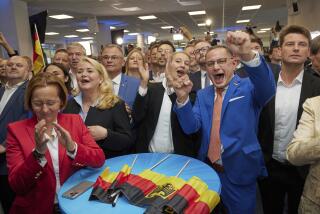Bosnia’s Ethnic Divide on Display
- Share via
SARAJEVO, Bosnia-Herzegovina — Four years after Bosnia’s war ended, weekend elections showed how deep the ethnic divide in this country remains, as Muslim voters shifted toward moderate leaders while Serbs and Croats stayed with old-style nationalists.
Although official preliminary results in the vote for municipal councils were not expected until today, the contending parties’ own estimates of their showings were being regarded Sunday as reliable. In the past, such assertions have generally proved accurate.
The moderate Social Democratic Party claimed victory Sunday in 20 cities over hard-line Muslim leader Alija Izetbegovic’s Party of Democratic Action.
Meanwhile, in the Bosnian Serb Republic--which encompasses almost half the country--the Serbian Democratic Party, founded by indicted war crimes suspect Radovan Karadzic, said it had won 56.5% of the vote.
Last week’s arrest on war crimes charges of Momcilo Krajisnik, Karadzic’s right-hand man, was seen as a major factor in the defeat Saturday of a coalition of Western-backed Serbian moderates led by the republic’s prime minister, Milorad Dodik.
“The arrest of Krajisnik caused many people to vote emotionally,” said Slavko Mitrovic, a senior aide to Dodik.
Although Karadzic is hiding from NATO-led peacekeeping troops who have vowed to arrest him, he cast a large shadow over the elections, with his party’s candidates accusing Dodik of humiliating Serbs by cooperating with the West.
Among Bosnian Croats, voters reportedly continued to back hard-line nationalists of the Croatian Democratic Union, or HDZ, despite the victory of moderates over the HDZ in neighboring Croatia in January.
After that loss, which followed the death of HDZ founder and Croatian President Franjo Tudjman, the new center-left coalition in the Croatian capital, Zagreb, moved to cut off financial support for Bosnian Croat extremists. But the hard-liners said they had managed to hold their ground at the polls.
The Office of the High Representative, the Western administration that holds power over Bosnia’s elected governments, saw the weekend elections as another step away from politics dominated by conflicting ethnic self-interests and toward more common concerns.
“If the trends translate into real results, they will show that people now put more emphasis on daily economic issues like jobs and pension payments rather than nationalist and ethnic rhetoric,” said Alex Stiglmayer, spokesman for the high representative, Wolfgang Petritsch of Austria.
The U.S. and other Western governments have poured billions of dollars into Bosnia-Herzegovina in an effort to rebuild the country as a multiethnic democracy after 43 months of war, which ended with the Dayton accords of late 1995. But although the Bosnian Serb Republic’s government opposes Yugoslav President Slobodan Milosevic, his hard-line supporters will continue to be strong in Bosnia as long as he remains in power, Stiglmayer said.
Despite progress on refugee returns in recent months, hard-line nationalists continue to frustrate efforts to reverse “ethnic cleansing” and return families to areas where they would form an ethnic minority.
Zlatko Lagumdzija, who heads the multiethnic Social Democratic Party, said Sunday that he expected to win in 20 municipalities, including Sarajevo, the Bosnian capital, and that, if he does, he will make sure minority refugees can return home without any conditions.
If Lagumdzija, a computer science professor who once taught in the U.S., can keep his momentum going over the coming months, his moderate party could win a crucial victory in national elections, expected this fall. But Bosnia’s three postwar elections have shown that the pendulum can quickly swing back in favor of hard-liners. Lagumdzija warned that the country’s severe economic problems, which he said are “rapidly escalating into an economic crisis,” threaten to undercut moderates like him.
About 70% of Bosnia’s 2.46 million eligible voters cast ballots in the municipal elections, which involved more than 21,000 candidates from 68 political parties. Candidates were competing for 3,300 elected positions.
Some voters complained that they had trouble finding their correct polling stations, but “while there were isolated incidents of intimidation and extremism, overall we see these elections as free and fair,” said Ambassador Robert Barry, U.S. head of the Bosnian mission of the Organization for Security and Cooperation in Europe. It organized the balloting.
Izetbegovic’s Party of Democratic Action claimed victory for his party and coalition partners in 35 municipalities in the Muslim-Croat Federation, which shares the country with the Serb Republic.
Western officials have criticized Izetbegovic’s party as corrupt, and they blame it, along with hard-line Serbian and Croatian parties, for blocking the return of refugees.
Special correspondent Zoran Cirjakovic contributed to this report.
More to Read
Sign up for Essential California
The most important California stories and recommendations in your inbox every morning.
You may occasionally receive promotional content from the Los Angeles Times.













